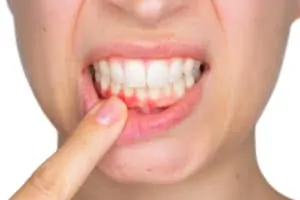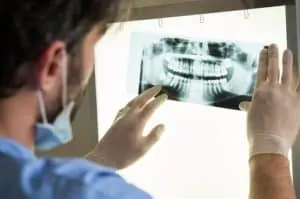
Brushing Your Teeth
Yes, your dentist in Asheboro just said that brushing your teeth can be causing damage to your smile, but there’s a catch. Brushing your teeth too hard can cause gums to recede. Once the protective gum tissue pulls away from the tooth, you can experience painful sensitivity and, if left untreated, could eventually cause gum disease or even tooth loss. Avoid using a back and forth scrubbing motion and focus on brushing in soft circles. Also, make sure you’re using the right toothbrush for you. Usually a soft bristled brush is best.
Biting Your Nails
This is one of two habits that’s not only dangerous for your oral health, but also your overall health (we’ll get the other one is just a bit). Nail biting can introduce all sorts of bacteria that are hiding under nails into your system. And as we know, bacteria isn’t good and can make us sick. In reference to your oral health, biting your nails can lead to jaw issues as well as tooth damage. The position your jaw is in while nibbling on nails can place unnatural pressure on the joint. Doing this repeatedly over years can result in jaw pain or TMJ/TMD. Nails are also made of a hard material, and hard material doesn’t mix well with teeth. Biting nails can lead to chips or cracks in your teeth. To help you break the habit, try using a bitter-tasting nail polish (it even comes in clear if you’re not into colorful nails) to make putting nails to mouth less appealing.
Smoking or Using Tobacco
We mentioned we’d be talking about another habit that’s both dangerous to oral health and overall health… smoking or any type of tobacco use.. It’s fairly common knowledge that using tobacco can lead to all sorts of health problems, but it can also cause some pretty scary oral health issues. Not only can tobacco in any form cause yellow teeth, it can also increase risk for oral cancer or gum disease, which bring on a whole set of problems of their own. We encourage anyone who uses tobacco to try to quit. We know it’s incredibly hard, but we know you can do it.
Clenching and Grinding
Clenching and grinding teeth typically occurs as a response to stress, but it can also happen subconsciously during sleep. No matter when it happens, the results are usually the same. People who clench or grind their teeth tend to experience jaw pain and suffer from TMJ/TMD. What’s more, damage to teeth or dental restorations can also occur. Most times, relief is found by using a nightguard which keeps the teeth from rubbing together or the user from biting down forcefully.
Even though our Asheboro dental office is all about preventing dental problems before they arise, we know that issues will still occur, sometimes as a result of any of the habits listed above. If you ever encounter a problem with your smile, we always welcome you to give us a call.















